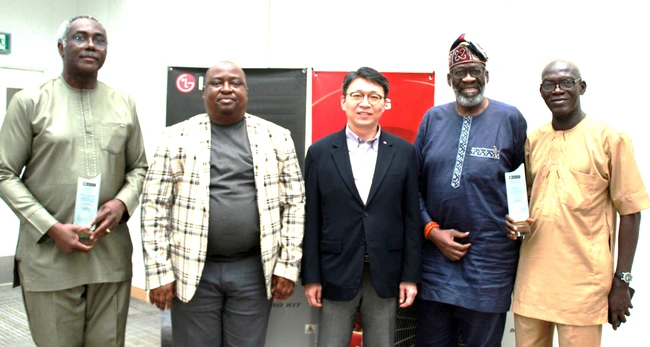Strategic communications experts are worried about the increasing impact organisational crisis is having on corporate performance warning that crisis in organisation is now what they described as the new normal.
And according to the Group Chief Executive Officer, The Newmark Group Limited, Gibert Manirakiza, strategic crisis management has become the new normal in the corporate world due to its impact on the entire fibre of business.
Manirakiza, was one of the strategic communications experts that dissected the issues on crisis management at a webinar put together by The Newmark Group Limited under the InfluenceXXI series with the theme: “Navigating Crisis Communications: Strategies for Effective Messaging During Crises.”
In his opening address just before the business leaders in the corporate communications world began the discourse, he harped on the need for managers not to shy away from the issues or wait till crisis blow-out of measures uncontrollably saying that “the tendency has been to hide in the sand, to hide and try to ignore this particular crisis and let it blow over so to speak.”
He lamented the fact that leaders in corporate communications and other professionals find it difficult to make other business leaders understand how important the subject of discourse is stressing that there had been situations whereby brands were caught in the crisis that they were not responsible for.
He added that sometimes the crisis comes from action or inaction, error of commission or remission by a brand or a team in a given organisation.
“And in some cases, we’ve seen that in Africa generally speaking but in Nigeria specifically speaking, the tendency has been to hide in the sand, to hide and try to ignore this particular crisis and let it blow over so to speak”, he said.
Speaking further, Manirakiza warned, “But I just want to break the news, particularly for corporate leaders but also for other organisations or leaders that this is no longer going to be an option going forward.”
He recalled that recent studies show that waiting for something to happen before taking action accounts for up to 40% of market value of most companies noting that it’s just not an option for any brand to take that approach of wait for the crisis to blow over.
“In many cases, crisis come because maybe there is no culture that allows people to escalate and point out the potential issue or potential crisis within the ecosystem of an organization or an entity, which means that at the core of the ecosystem, there needs to be a crisis friendly culture”, he stated.
He urged that CEO should constantly check whether they will be able to catch a crisis before it actually becomes one that they need to react to it with communications and messaging.
While also calling on CEOs to brand reputation and trust matters serious, he stressed that they have to think about the drivers of trust not just during that moment of crisis but also wait before.
“So things like integrity, reliability expertise, social responsibility, customer experience, reputation have to really be the foundation of the relationship that a brand would build with audiences and stakeholders”, he stated.
And more worrisome for the CEOs, according to the Founder, Carpe Diem Solutions, Mr Edward Isreal-Ayide was the fact there was a time when news cycles were dependent on almost people moving from place to place, or it would take maybe about 24 hours for something to get to bring to support to broadcast.
Unfortunately, he noted that nowadays the digital pages are broad-related in increased speech, so information breaks in real time and also information is breaking.
“There’s also the fact that where the age we’ve crossed is broken, institutions have gone main, some become less accountable, fake news has become the other of the day as well”, he said.
According to him, presently it just take a ton of crisis, and not a cloud to create chaos stressing that organisations need to be concise, to share accurate information, and share detailed information.
While stressing the need for accuracy and transparency in all information going out in time of crisis management, he called on management to continue to monitor social media, also to be able to respond quickly and accurately to information.
Isreal-Ayide described the new normal as an era where news has become very volatile warning that at such a time like this, it is critical to ensure there is strong stakeholder relationships, “and this, of course, maybe even with media, this maybe would regulate us within your industry.”
He also noted the need for a one-time leadership statement saying that the social media has become the battle ground where information is broken, where information is made, where information is distorted, and within some cases.
Taking a dive into crisis management in the financial sector, Head of Brand and Marketing Communications, Wema Bank Plcl, Mrs Mabel Adeteye said that terrain in the financial sector is that which puts on the professional the responsibility of being always ready.
“It is important that we understand that our responsibilities as great communication experts covers four major activities or areas where we have to be constantly ready”, she explained.
According to her, when it comes managing crisis in the financial services sector, trust is a key issue of consideration saying, “in the financial industry, trust is something that can make or mar all your business. Here, you have to ensure that you are able to manage your stakeholders effectively. When we talk about retail banking, crisis in public trust can impact your contribution from being a systematic risk to the wider financial perspective of the business and for corporate and investment banking, we must have the ability to be able to provide complex messaging to financial stakeholders.”
She noted that the situation in the financial sector is must more different, since there are people who have invested their fund, who are like major stakeholders in keeping the business adding that as a corporate communication expert in the financial industry the rate of transparency and accountability must be high.
Chapter Lead, The Communication Avenue Lagos, Onyinye Nwachukwu, called for engagement with internal stakeholder and send them send a message to them, let them know what’s going on.
![]()










